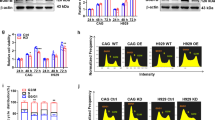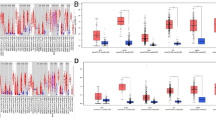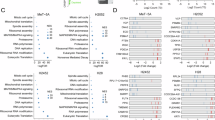Abstract
Mosaic variegated aneuploidy is a rare recessive condition characterized by growth retardation, microcephaly, childhood cancer and constitutional mosaicism for chromosomal gains and losses. In five families with mosaic variegated aneuploidy, including two with embryonal rhabdomyosarcoma, we identified truncating and missense mutations of BUB1B, which encodes BUBR1, a key protein in the mitotic spindle checkpoint. These data are the first to relate germline mutations in a spindle checkpoint gene with a human disorder and strongly support a causal link between aneuploidy and cancer development.
This is a preview of subscription content, access via your institution
Access options
Subscribe to this journal
Receive 12 print issues and online access
$259.00 per year
only $21.58 per issue
Buy this article
- Purchase on SpringerLink
- Instant access to the full article PDF.
USD 39.95
Prices may be subject to local taxes which are calculated during checkout

Similar content being viewed by others
References
Bharadwaj, R. & Yu, H. Oncogene 32, 2016–2027 (2004).
Draviam, V.M. et al. Curr. Opin. Genet. Dev. 14, 120–125 (2004).
Lengauer, C. et al. Nature 396, 643–649 (1998).
Tolmie, J.L. et al. Hum. Genet. 80, 197–200 (1988).
Limwongse, C. et al. Am. J. Med. Genet. 82, 20–24 (1999).
Plaja, A. et al. Am. J. Med. Genet. 98, 216–223 (2001).
Kajii, T. et al. Am. J. Med. Genet. 104, 57–64 (2001).
Jacquemont, S. et al. Am. J. Med. Genet. 109, 17–21 (2002).
Tang, Z. et al. Dev. Cell 1, 227–237 (2001).
Mao, Y. et al. Cell 114, 87–98 (2003).
Shin, H.-J. et al. Cancer Cell 4, 483–497 (2003).
Dai, W. et al. Cancer Res. 64, 440–445 (2004).
Baker, D.J. et al. Nat. Genet. 36, 744–749 (2004).
Cahill, D.P. et al. Nature 392, 300–303 (1998).
Shichiri, M. et al. Cancer Res. 62, 13–17 (2002).
Acknowledgements
We thank all the families that gave informed consent to take part in this research; the many clinicians that were involved in their diagnosis and management, including D. Bain, H. Cox, A. Green, A. McEwen, T. Vendrell, P. Ellis and R. Murray; M. Stratton and A. Futreal for advice on the manuscript; and K. Tatton-Brown and T. Min for help in preparation of the figure. A.I. is supported by Tenovus the Cancer Charity. This research was supported and approved by the Institute of Cancer Research (UK).
Author information
Authors and Affiliations
Corresponding author
Ethics declarations
Competing interests
The authors declare no competing financial interests.
Rights and permissions
About this article
Cite this article
Hanks, S., Coleman, K., Reid, S. et al. Constitutional aneuploidy and cancer predisposition caused by biallelic mutations in BUB1B. Nat Genet 36, 1159–1161 (2004). https://doi.org/10.1038/ng1449
Received:
Accepted:
Published:
Issue date:
DOI: https://doi.org/10.1038/ng1449
This article is cited by
-
RNA sequencing and target long-read sequencing reveal an intronic transposon insertion causing aberrant splicing
Journal of Human Genetics (2024)
-
Sudden unexpected postnatal collapse and BUB1B mutation: first forensic case report
International Journal of Legal Medicine (2024)
-
Principles and dynamics of spindle assembly checkpoint signalling
Nature Reviews Molecular Cell Biology (2023)
-
Germline sequence variants contributing to cancer susceptibility in South African breast cancer patients of African ancestry
Scientific Reports (2022)
-
Physiological relevance of post-translational regulation of the spindle assembly checkpoint protein BubR1
Cell & Bioscience (2021)



